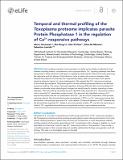Temporal and thermal profiling of the Toxoplasma proteome implicates parasite Protein Phosphatase 1 in the regulation of Ca2+-responsive pathways
Author(s)
Herneisen, Alice L; Li, Zhu-Hong; Chan, Alex W; Moreno, Silvia NJ; Lourido, Sebastian
DownloadPublished version (7.991Mb)
Publisher with Creative Commons License
Publisher with Creative Commons License
Creative Commons Attribution
Terms of use
Metadata
Show full item recordAbstract
<jats:p>Apicomplexan parasites cause persistent mortality and morbidity worldwide through diseases including malaria, toxoplasmosis, and cryptosporidiosis. Ca<jats:sup>2+</jats:sup> signaling pathways have been repurposed in these eukaryotic pathogens to regulate parasite-specific cellular processes governing the replicative and lytic phases of the infectious cycle, as well as the transition between them. Despite the presence of conserved Ca<jats:sup>2+</jats:sup>-responsive proteins, little is known about how specific signaling elements interact to impact pathogenesis. We mapped the Ca<jats:sup>2+</jats:sup>-responsive proteome of the model apicomplexan <jats:italic>Taxoplasma gondii</jats:italic> via time-resolved phosphoproteomics and thermal proteome profiling. The waves of phosphoregulation following PKG activation and stimulated Ca<jats:sup>2+</jats:sup> release corroborate known physiological changes but identify specific proteins operating in these pathways. Thermal profiling of parasite extracts identified many expected Ca<jats:sup>2+</jats:sup>-responsive proteins, such as parasite Ca<jats:sup>2+</jats:sup>-dependent protein kinases. Our approach also identified numerous Ca<jats:sup>2+</jats:sup>-responsive proteins that are not predicted to bind Ca<jats:sup>2+</jats:sup>, yet are critical components of the parasite signaling network. We characterized protein phosphatase 1 (PP1) as a Ca<jats:sup>2+</jats:sup>-responsive enzyme that relocalized to the parasite apex upon Ca<jats:sup>2+</jats:sup> store release. Conditional depletion of PP1 revealed that the phosphatase regulates Ca<jats:sup>2+</jats:sup> uptake to promote parasite motility. PP1 may thus be partly responsible for Ca<jats:sup>2+</jats:sup>-regulated serine/threonine phosphatase activity in apicomplexan parasites.</jats:p>
Date issued
2022-08-17Department
Massachusetts Institute of Technology. Department of BiologyJournal
eLife
Publisher
eLife Sciences Publications, Ltd
Citation
Herneisen, Alice L, Li, Zhu-Hong, Chan, Alex W, Moreno, Silvia NJ and Lourido, Sebastian. 2022. "Temporal and thermal profiling of the Toxoplasma proteome implicates parasite Protein Phosphatase 1 in the regulation of Ca2+-responsive pathways." eLife, 11.
Version: Final published version